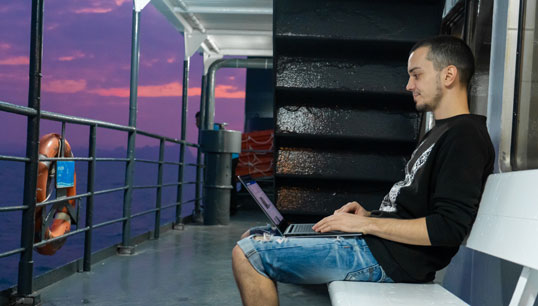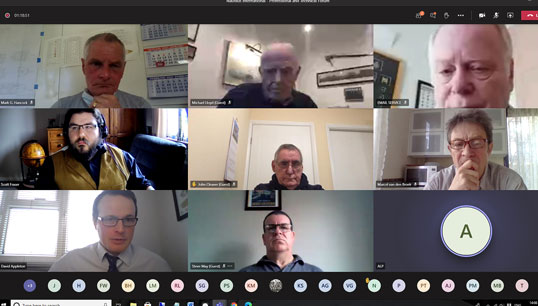- Topics
- Campaigning
- Careers
- Colleges
- Community
- Education and training
- Environment
- Equality
- Federation
- General secretary message
- Government
- Health and safety
- History
- Industrial
- International
- Law
- Members at work
- Nautilus news
- Nautilus partnerships
- Netherlands
- Open days
- Opinion
- Organising
- Switzerland
- Technology
- Ukraine
- United Kingdom
- Welfare

Covid-19, Brexit and satellite back-ups were the big issues tackled at the January 2021 Nautilus Professional & Technical Forum meeting – with a record turnout of members hearing updates from the Union and contributing expertise to policy debates. Sarah Robinson reports
The Nautilus Professional & Technical Forum's first meeting of 2021 had to take place online as a consequence of the pandemic, but in some ways it was an improvement on the Forum's usual 'real-world' sessions in hotels or offices, because over 35 members were able to attend. Some even tuned in from their vessels.
After a welcome from Nautilus deputy general secretary Marcel van den Broek, the session got underway with updates and discussions on the impact of Covid-19 led by professional & technical officer David Appleton.
Crew change crisis
Nautilus has lobbied hard to persuade national governments to designate seafarers as key workers, said Mr Appleton, which should have led to an easing of travel restrictions and a resolution to the crew change crisis.
However, the emergence of new, more contagious strains of the coronavirus in late 2020 had led some authorities to backtrack on their obligations, and the Union has had to redouble its efforts to gain work-related exemptions for seafarers. Members are reminded that they can download a pro-forma letter about these exemptions from the Nautilus website.
Training and recertification during the pandemic
Mr Appleton reported that the Union had worked with the UK Maritime & Coastguard Agency (MCA) and Merchant Navy Training Board (MNTB) to achieve emergency approval of online learning for trainees unable to attend college due to the pandemic.
There have also been extensions to the SMarT funding scheme to help sponsoring employers keep cadets on their payroll for longer than the usual 150-week training period in case their training had been delayed by the crisis.
Despite this, news has emerged of some companies terminating training contacts. This is being investigated by Nautilus as a matter of urgency, and members are asked to let the Union know immediately if they experience any problems.
Regarding recertification, UK seafarers can get temporary extensions to refresher training and medical certificates if they have been unable to renew certificates due to the pandemic, and members should contact the Union if they are having any difficulties with this or any other issue relating to certification or revalidation.
Covid-19 vaccinations
The Covid-19 vaccination programme is well-advanced in the UK, with most of the priority group of people aged over 70 now reached. Working-age people could start receiving their jabs in March or April, particularly if they have a long-term health condition such as diabetes. Once the initial phase is complete, there is a possibility that certain workers will be prioritised, and Nautilus has already written jointly with the UK Chamber of Shipping to the Health Secretary setting out the case for seafarers to be given priority.
A member asked whether it might be possible to arrange in future for seafarers to have both their first and second doses of the vaccination while on their leave period in the UK – perhaps through the Dreadnought Medical Service.
Another idea for those who need to go back to work deepsea before the appointed date for their second 'booster' dose could perhaps be to take the second dose away securely to administer onboard ship after the required number of weeks, as this is something that has been done in the past for the yellow fever vaccination. Mr Appleton confirmed that Nautilus would be lobbying government to make arrangements to facilitate the delivery of vaccines to seafarers.
There are also issues to be addressed as to whether an internationally-recognised certificate of Covid-19 vaccination should be developed, and whether it would be legal or ethical for employers to demand that seafarers hold these as a condition of employment.
This could disadvantage seafarers from countries with little or no vaccination programme and perhaps mean worldwide that some vaccine doses are effectively taken away from the elderly people who are more susceptible to serious complications and death from Covid-19. Nautilus will continue to engage with the authorities on these issues at national and international level.
A member suggested that seafarers should be allowed to have their first and second vaccine doses while on leave
Impact of Brexit on UK seafarer certification
The next item on the Forum agenda was the Brexit deal reached between the UK and EU at the end of December 2020. David Appleton reported that the deal had not directly addressed the reciprocal recognition of seafarer certification, so the UK was effectively in a 'no deal' position on this.
However, thanks to the combined efforts of unions and employers, interim measures have been put in place to ensure that UK seafarers will continue to be eligible for endorsements from the major maritime employers in the EU until such time as the UK is formally recognised by the European Maritime Safety Agency (EMSA).
A member asked whether any benefits to seafarers had started to emerge from Brexit. Mr Appleton noted that one welcome change from the Nautilus perspective was that the UK administration was now free to make proposals to the International Maritime Organization (IMO) to address issues such as fatigue without the EU approval which had been required previously.
Back-up for satellite backouts
Professional & Technical Forum chair Clive Evans introduced this item, highlighting some of the concerns that had recently been raised by Nautilus members and other figures in the industry.
Forum participants had been supplied with a briefing document giving more information on the world’s heavy reliance on Global Navigation Satellite Systems (GNSS) for positioning and timing. With little now available as back-up if something went wrong with GNSS, the document detailed threats and vulnerabilities such as jamming, spoofing, space weather, withdrawal or degradation of service, and cyber-attack.

At the Forum, David Appleton kicked off the discussion by asking participating members what would actually happen on their vessels if satellites went down: 'Could you contact your company, and could you fix your position and navigate?'
Members then offered many useful insights, discussing for example the difficulties of carrying out dead reckoning using Electronic Chart Display and Information Systems (ECDIS) when satellite connections were lost. There were also concerns that younger seafarers were not being given opportunities to keep up their skills in using sextants and paper charts once they had finished college and had entered full-time work.
The points made in this discussion have now been taken away by Mr Evans, Mr Appleton, Mr Van den Broek and deputy Forum chair John Cleaver to feed into the development of a plan of action, and there will be more on this subject in an upcoming issue of the Nautilus Telegraph.
Seafarers' mental health
In the 'Any other business' section at the end of the Forum’s agenda, the main concern members wanted to raise was the mental health challenges facing seafarers, particularly in the context of the pandemic crew change crisis.
Mr Appleton noted that UK cadets are now studying a module on mental health as part of their officer training, and services to support seafarers in times of trouble are regularly publicised on the Nautilus website and in the Nautilus Telegraph – efforts which will continue.
Tags
More articles
Solidarity among the three percent – a round-up of events held for women in maritime
Neptune Declaration: reality vs rhetoric
Seafarers caught up in the crew change crisis have called the Neptune Declaration 'empty rhetoric', telling the maritime world to stop patting itself on the back and understand the reality of travel restrictions and quarantines for seafarers.
Tip of the iceberg?
Government must rethink quarantine hotel measures for seafarers
Nautilus has urged the government to rethink its policy to refuse key worker seafarers from hotel quarantine.
Let's talk about vaccination
What's the problem with the Ensign Retirement Plan?
Train officers in stress management, urge medical experts
Ships' officers should be trained to deal with stress management and cultural differences among multinational crews, a new study by German maritime medical experts has concluded.
